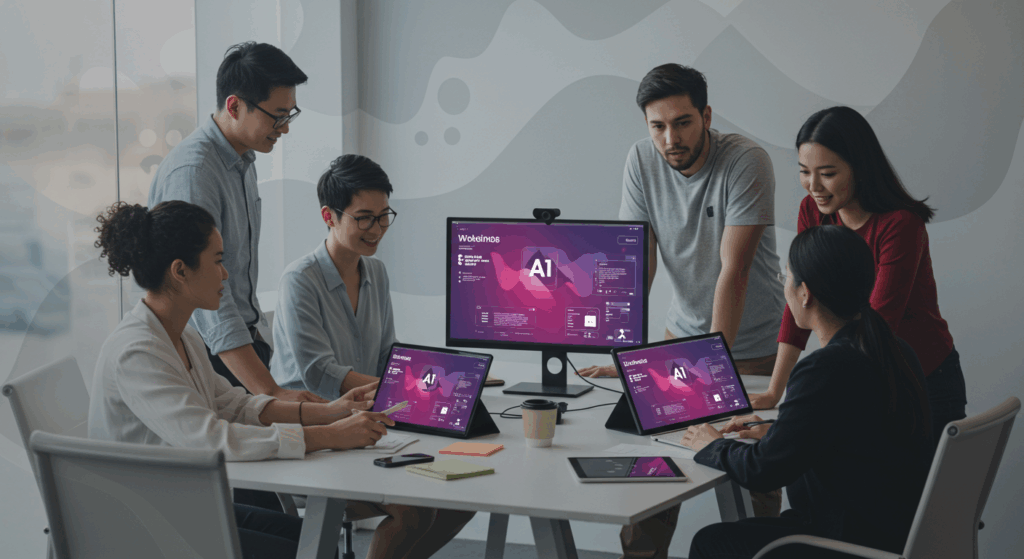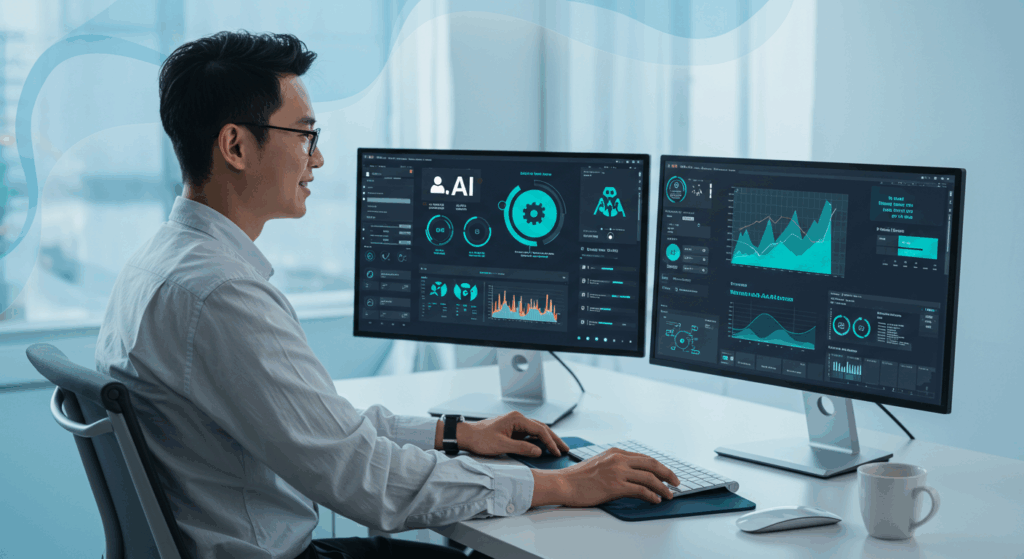AI-powered marketing automation transforms business results with measurable efficiency gains. Key findings include 84% faster content delivery, significant cost reductions through personalization, and 15% more revenue for fast-growing companies. Organizations report substantial time savings, enhanced personalization capabilities, and streamlined workflows across all marketing channels. Start with AI digital asset management to maximize automation benefits across your entire marketing stack.
With 88% of marketers now relying on AI in their daily work and the global AI marketing market projected to reach $47.32 billion, artificial intelligence is becoming essential for survival. Research from Forrester reveals that 67% of AI decision-makers plan to increase their investment in generative AI within the next year, showcasing its growing importance in enterprise strategies.
Here’s what separates successful AI adoption from the noise: understanding the tangible benefits that AI-powered marketing automation brings to your organization. Consumers expect personalized experiences at lightning speed, and businesses that can’t deliver are getting left behind.
AI-powered content operations platforms combine intelligent asset management with streamlined workflows that actually work. Organizations using AI marketing automation see measurable improvements across every key performance indicator that matters.
What Is AI-Powered Marketing Automation?
AI-powered marketing automation is the integration of artificial intelligence technologies, including machine learning, natural language processing, and computer vision, into your entire marketing ecosystem.
This intelligent automation analyzes vast amounts of customer data in real time, predicts behaviors, personalizes content at scale, and automatically optimizes campaigns. Unlike conventional automation that follows preset rules, AI marketing automation continuously learns and adapts, making decisions that improve over time.
The technology encompasses everything from AI digital asset management systems that automatically tag and organize content, to predictive analytics that anticipate customer needs, to LLM marketing tools that generate personalized copy across multiple channels simultaneously.
How Does AI-Powered Marketing Automation Boost Productivity and Save Time?
The productivity gains from AI marketing automation are nothing short of remarkable. Organizations consistently report dramatic time savings across their most resource-intensive tasks.

Eliminates Manual Content Management Tasks
Traditional content management consumes enormous amounts of time. Marketing teams spend hours manually tagging assets, searching for the right images, and organizing files across different platforms. AI digital asset management changes this dynamic.
Advanced systems now use computer vision and natural language processing to automatically analyze, categorize, and tag digital assets as soon as they’re uploaded. Your team can find the perfect image for a campaign in seconds, not hours. Marketing teams report dramatically reduced search times and improved asset discoverability through AI-powered automation.
AI digital asset management platforms exemplify this transformation, using predictive metadata and smart tagging to eliminate the manual work that traditionally consumed marketing teams’ most valuable time.
Automates Repetitive Campaign Tasks
AI-powered platforms can handle everything from social media scheduling to email personalization without human intervention. The technology learns optimal posting times for different audience segments, automatically adjusts send times for maximum engagement, and creates A/B test variants for subject lines and content.
AI marketing leaders are using automation to drive productivity while maintaining alignment between marketing and IT teams. Employees using these automated workflows report productivity improvements because they’re freed from routine tasks to focus on strategy and creative thinking. Teams experience AI productivity gains when they can redirect their energy from maintenance to innovation.
Accelerates Content Creation Cycles
AI marketing automation speeds up content creation. Instead of starting from scratch for each campaign, AI can generate initial drafts, suggest improvements, and create variations optimized for different channels and audiences.
Organizations report 84% faster high-quality content delivery when using AI-assisted creation tools, allowing marketing teams to respond to opportunities and trends in real time rather than weeks later. LLM marketing tools excel at generating contextual variations of copy across different channels while maintaining brand voice consistency.
How Does AI Marketing Automation Improve Cost Efficiency and ROI?
Smart organizations are seeing substantial improvements in their bottom line through more efficient resource allocation and better campaign performance. Research shows that personalization marketing can reduce customer acquisition costs by as much as 50% and increase revenues by 5–15%.
Reduces Agency and External Costs
Many marketing teams rely heavily on external agencies for content creation, campaign management, and creative services. AI marketing automation brings many of these capabilities in-house, resulting in worthwhile cost savings.
When AI can automatically create campaign variations and optimize creative assets, organizations report substantial reductions in external creative service dependencies while improving content quality and consistency.
Maximizes Campaign Performance Through Optimization
Intelligent automation continuously monitors campaign performance across all channels and makes automatic adjustments to improve results. Your advertising spend gets optimized constantly for better performance rather than running on set-and-forget autopilot.
Research shows that personalization marketing can increase marketing ROI by 10–30% by eliminating wasteful spending on underperforming channels and audiences while doubling down on what’s working.
Eliminates Wasteful Manual Processes
Traditional campaign management creates inherent inefficiencies through human limitations. Manual processes miss optimization opportunities and can’t handle the volume of data needed for truly effective decision-making.
Intelligent automation removes these bottlenecks by handling complex optimization tasks that would overwhelm human capacity, ensuring marketing resources focus on impactful activities rather than routine maintenance.
How Does AI Transform Content and Creative Automation?
Content creation has traditionally been one of marketing’s biggest bottlenecks. AI marketing automation is augmenting human creativity with intelligent assistance and automation. Modern content personalization tools are making it possible to create individualized experiences at an unprecedented scale.
Generates Brand-Consistent Content at Scale
Creating multiple versions of campaigns for different audience segments used to require separate manual creation for each variation. Intelligent automation can automatically generate these campaign variants, ensuring consistent brand messaging while adapting visual elements and copy for different contexts.
Brands can deliver the personalized experiences that 71% of consumers now expect without requiring proportional increases in creative resources.
Optimizes Visual Assets Automatically
Intelligent systems automatically crop images for different platforms, adjust color schemes for brand consistency, and remove or replace elements within images to better match campaign needs.
Manufacturing companies have reduced their visual asset preparation time by hundreds of hours annually through AI-powered smart cropping and optimization features that automatically generate platform-specific variations.
Streamlines Brand Compliance and Consistency
Maintaining brand consistency across multiple campaigns, channels, and team members has always been challenging. AI marketing automation automatically checks creative assets against brand guidelines and flags potential issues before they go live.
Advanced systems can even automatically correct minor brand inconsistencies, ensuring that every piece of content meets established standards without requiring manual review processes.
How Does AI Enable Better Personalization and Customer Experiences?
Personalization has moved from nice-to-have to absolutely essential. AI marketing automation makes sophisticated personalization possible at scale, creating experiences that feel individually crafted for each customer.
Delivers Real-Time Content Customization
AI can analyze customer behavior and instantly customize content based on individual preferences, past interactions, and predicted interests. This process includes dynamic product recommendations, customized messaging, and personalized visual elements.
Predicts Customer Needs and Behaviors
Rather than responding to customer actions, AI can predict what customers will want before they know it themselves. Marketers can proactively create content and campaigns that address customer needs at exactly the right moment.
AI productivity improvements come partly from this predictive power. When you know what customers want in advance, you can prepare more effectively and avoid reactive scrambling.
Creates Dynamic Customer Journey Mapping
AI marketing automation continuously maps and optimizes customer journeys based on actual behavior data rather than theoretical models. It identifies the most effective touchpoints and automatically adjusts future interactions to more effectively guide customers toward conversion.
This dynamic optimization ensures that marketing efforts are always aligned with how customers actually behave rather than how marketers think they should behave.
How Does AI Provide Superior Analytics and Marketing Intelligence?
Data analysis has always been vital for marketing success, but the volume and complexity of modern marketing data often overwhelm traditional approaches. AI marketing automation transforms raw data into actionable insights.
Processes Complex Data Sets Instantly
Modern marketing generates enormous amounts of data across multiple channels, platforms, and touchpoints. AI can process and analyze this data in real time, identifying patterns and opportunities that would take human analysts weeks to uncover.
Instant analysis means marketing decisions are based on complete, current information rather than outdated or incomplete datasets.
Identifies Hidden Performance Patterns
AI excels at finding non-obvious connections in data. It can identify which seemingly unrelated factors contribute to campaign success, discover new audience segments with high conversion potential, and predict which content themes will resonate with different customer groups.
These hidden insights often lead to breakthrough improvements in campaign performance that human analysis would miss entirely.
Provides Predictive Campaign Forecasting
Intelligent marketing platforms predict future campaign results based on historical data and current market conditions. This forecasting capability helps marketing teams allocate budgets more effectively and set realistic performance expectations.
LLM marketing tools are particularly effective at analyzing text-based content performance and predicting which messaging approaches will work best for specific audiences and situations.
AI-Powered vs. Traditional Marketing Automation: What’s the Difference?
| Aspect | Traditional Automation | AI-Powered Automation |
| Decision Making | Rule-based, static conditions | Learning algorithms, adaptive responses |
| Content Personalization | Basic segmentation | Individual-level customization |
| Data Processing | Limited datasets | Processes vast, complex data in real time |
| Optimization | Manual adjustments needed | Continuous automatic improvement |
| Content Creation | Templates and manual input | AI-generated variations and suggestions |
| Asset Management | Manual tagging and organization | Automatic categorization and metadata |
| Performance Analysis | Historical reporting | Predictive insights and recommendations |
| Scalability | Linear resource requirements | Scales without proportional resource increases |

What Are Real-World Examples of AI Marketing Automation Success?
Leading organizations across diverse industries are already capturing significant value from AI marketing automation, with implementations demonstrating measurable improvements in efficiency, cost savings, and operational performance. These case studies showcase how intelligent automation transforms content operations from manual bottlenecks into strategic advantages.
Publishing Company Revolutionizes Asset Management
Hachette Book Group, a leading U.S. publisher with over 600,000 products, transformed its outdated digital asset management system with AI-powered automation.
The implementation enabled automated overnight distribution of book covers to retailers, while AI optical character recognition reads product labels in images, PowerPoint, PDF, Word, and Excel documents, automatically adding this information to metadata. Assets are quickly findable and available to everyone as soon as they’re uploaded, creating what their team calls “a beautiful automatic system.”
Manufacturing Company Scales AI-Powered Content Operations
Plaid Enterprises, one of the world’s largest manufacturers of creative DIY products, leveraged advanced AI capabilities to solve critical findability challenges during a surge in consumer demand.
Their AI implementation includes automated smart descriptions, optical character recognition, visually similar search, and language detection that automatically scrapes product SKU numbers, paint colors, descriptions, and brands to organize content. The system provides immediate content insights, automatically detects duplicates, and surfaces the most relevant assets. The entire 6-week implementation saved $15,000 in asset migration costs while dramatically improving operational efficiency.

How Do You Get Started with AI Marketing Automation?
Implementing AI-powered marketing automation requires a thoughtful, phased approach that builds capabilities over time rather than trying to transform everything simultaneously.
Assess Your Current Marketing Technology Stack
Begin by evaluating your existing tools and identifying the biggest pain points in your current processes. Look for areas where manual work is consuming disproportionate time or where inconsistent results indicate process problems. Optimizing your marketing technology stack is essential as you integrate AI capabilities across different platforms and workflows.
Focus on content management workflows, campaign execution processes, and performance analysis capabilities. These areas typically offer the highest return on AI automation investment.
Start with Foundation Technologies
AI digital asset management often provides the best starting point because it creates immediate productivity gains while establishing the data foundation needed for more advanced AI capabilities. Preparing your marketing team for AI transformation requires strategic planning around content storage, training, and technology integration.
Choose platforms that offer automatic asset tagging, intelligent search capabilities, and seamless integration with your existing creative and campaign management tools.
Implement Gradually and Measure Results
Roll out AI marketing automation capabilities in phases, starting with the processes that will show the clearest measurable improvements. Your team can adapt to new workflows while building confidence in the technology.
Track specific metrics like time-to-create for campaigns, asset search time, campaign performance improvements, and overall team productivity to quantify the benefits you’re achieving. AI productivity measurements help demonstrate ROI to stakeholders and identify areas for further optimization.

Train Your Team for AI-Augmented Work
Successful AI marketing automation requires teams that understand how to work effectively with AI tools. Invest in training that helps your team understand when to rely on AI suggestions and when human judgment is essential.
The most successful implementations treat AI as an intelligent assistant that amplifies human creativity rather than replacing human decision-making entirely. Comprehensive AI platforms demonstrate how integrated AI capabilities can work together to transform every aspect of the content lifecycle, from creation and management to distribution and optimization.
Frequently Asked Questions
How quickly can organizations see results from AI marketing automation? Many organizations report measurable productivity improvements within the first few months of implementation. Time savings from automated asset management and content creation are visible relatively quickly, while more sophisticated benefits like improved campaign performance and predictive insights develop over time as the AI systems learn from your data and processes.
What’s the biggest challenge when implementing AI marketing automation? The most common challenge is change management rather than technical implementation. Teams need time to adapt to AI-augmented workflows and learn how to effectively collaborate with intelligent systems. Success requires clear training, gradual rollouts, and strong leadership support for the transition.
How does AI marketing automation handle brand compliance and quality control? Advanced AI marketing automation systems include sophisticated brand governance capabilities that automatically check content against established guidelines. They can flag potential compliance issues, suggest corrections, and prevent non-compliant content from being published. This automated oversight often provides better consistency than manual processes while reducing the workload on brand management teams.
Can small and medium-sized businesses benefit from AI marketing automation? Absolutely. While enterprise organizations often capture the most attention, SMBs frequently see even greater relative benefits from AI marketing automation because they typically have more manual processes to optimize. Many AI marketing platforms now offer scalable pricing and implementation approaches specifically designed for smaller organizations.
Why Should You Transform Your Marketing Operations with AI-Powered Automation?
The benefits of AI-powered marketing automation extend far beyond simple efficiency gains. Organizations implementing these technologies report transformations in their approach to marketing strategy, execution, and optimization.AI has already transformed marketing. The question is whether your organization will lead this transformation or follow behind competitors who’ve already embraced these game-changing capabilities. Get a demo of Aprimo’s AI-enabled content operations platform and discover how intelligent automation can revolutionize your marketing results.


